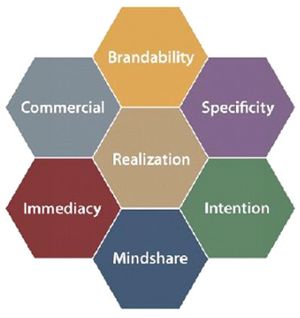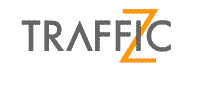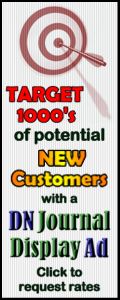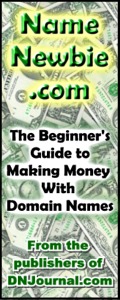|
Consumers
purchase domains for a variety of reasons. These unique
motivating factors shape the value which is attributed to domains by
individual buyers. It logically follows that a domain's true value
can only be attributed to a specific buyer at a particular moment in
time. Following is a framework of primary factors that buyers
commonly attach to each domain purchase.
Brandability
Brand is the emotional value that a buyer attributes to a
domain name. Effectively the brand is how users react to the domain
name being used and the feelings it generates. An easy way to
discern whether
a domain has a good brand is by applying the radio test. If you were
to hear a domain being talked about on the radio - how likely would
it be for a consumer to remember that domain and spell it
correctly? Strong brands are memorable, are hard to confuse
and elicit an emotional response. Examples: OverUnder.com,
SeaBreeze.com, Fantastic.com, Zappa.com, CoolJazz.com. |

|
|
Mindshare
Mindshare
is how "familiar" a domain name is in the user's mind. Commonly
used words and phrases used in domains offer a description of a
website's purpose and act as a preview of what a user can expect
when they type-in a domain. The easiest measure of mindshare is by
comparing search data on domain phrases. A domain phrase is simply
the domain broken into words with spaces between them and no
extension, mathgames.com = "Math Games".
Math
games would be a frequently searched phrase and therefore would also
make a memorable and familiar domain name. Commonly searched phrases
in search engines are a clear indication of phrase popularity and
usage which directly correlates to domain mindshare value. Examples:
GarageDoor.com, BonzaiTree.com, BuildingPlans.com, DownloadGames.com.
|

Dan
Warner discussing the points in this
article at the Domainfest Global Conference
in Los Angeles - February 2007 |
Commerciality
Commerciality
is a general concept attributed to the value of users visiting
a domain. Potential consumers (business, non-profit, or
personal) all have an inherent value. If a domain attracts
users of a commercial variety they have a higher value than
other more
general
domains. A good measure of commercial value is the bid price
that advertisers are willing to pay for a phrase (domain
phrase) in pay per click search advertising. As these bid
prices are based on a competitive auction system, the bid
prices clearly indicate what the market is willing to pay for
each phrase relative to other domain phrases. Example:
HomeLoans.com, CriminalLawyer.com, BusinessSoftware.com,
TowerCraneRental.com,
CommercialCoffeeMachines.com. |
Specificity
Although
short popular domains are frequently newsworthy, the most valuable
domains in practice to a buyer are related to how closely a domain
name correlates to their unique needs. If a buyer needed a domain
for a sailboat rental company in Seattle,
SeattleSailing.com
is more targeted to their specific needs than a domain like
Sailing.com. This is particularly true when considering domains for
businesses with a strong location bias. It is also common to use
qualifiers in domains to specify the business types; these include
discount, used, services, consulting, or premium. Examples:
UsedBikes.com, HoustonTools.com, DiscountTires.com,
MachineryMechanics.com, HouseCleaningServices.com.
Realization
The
value a buyer can realize through the use of a domain name directly
correlates to the price they paid compared to the benefits achieved.
This concept is a direct reflection of "fit for purpose".
How well does the domain fit with the needs of the buyer? If a
business
serves
the United States construction industry with supplies -
ConstructionSupplies.com may be an appropriate purchase for
$100,000. Whereas the same domain may be inappropriate for a local
business. Domain value is a direct reflection of what value can be
extracted from each domain by the intended buyer.
|
Immediacy
Retail domain purchases are generally not opportunistic.
Most retail buyers have a specific purpose in mind that they
are trying to fulfill and are frequently under short time
constraints. Common reasons include: having new business
cards printed, building a new website, having a new product
to promote, or meeting a strategic objective. These buyers
usually do not have the knowledge or experience to
"shop around" for the right domain name. The most
common buying strategies include simply typing in random
domain names to see if they resolve in a browser, or by
going to their favorite domain registrar. These buyers
usually will only purchase an aftermarket domain if they can
find one that aligns with their perceived value in price and
purpose within a short period of time. Otherwise they
commonly buy a "new registration” domain of less
apparent value. |

|
Intent
Domains that use common generic language to communicate clear
descriptive ideas are very effective. These domains have higher
click-through rates in search engines when users are looking for
related phrases, and the language used to construct the domains
clearly identifies the type of website represented. However, domains
which are confusing, have typographical errors or have legal
connotations are not good candidates for aftermarket sales. These
non-generic domains create customer service issues and many have
significant legal risks.
Conclusion
Retail
domain buyers are looking for domains which are immediately
available, fit for purpose, and represent real value to their
applied use. In order to fulfill these needs the aftermarket domain
industry has to make available a wide range of domain stock through
a comprehensive distribution network. Buyers need ready access to
domains using real time fulfillment with consistent quality and
comparative prices.
*****
Return
to DN Journal Home Page |














